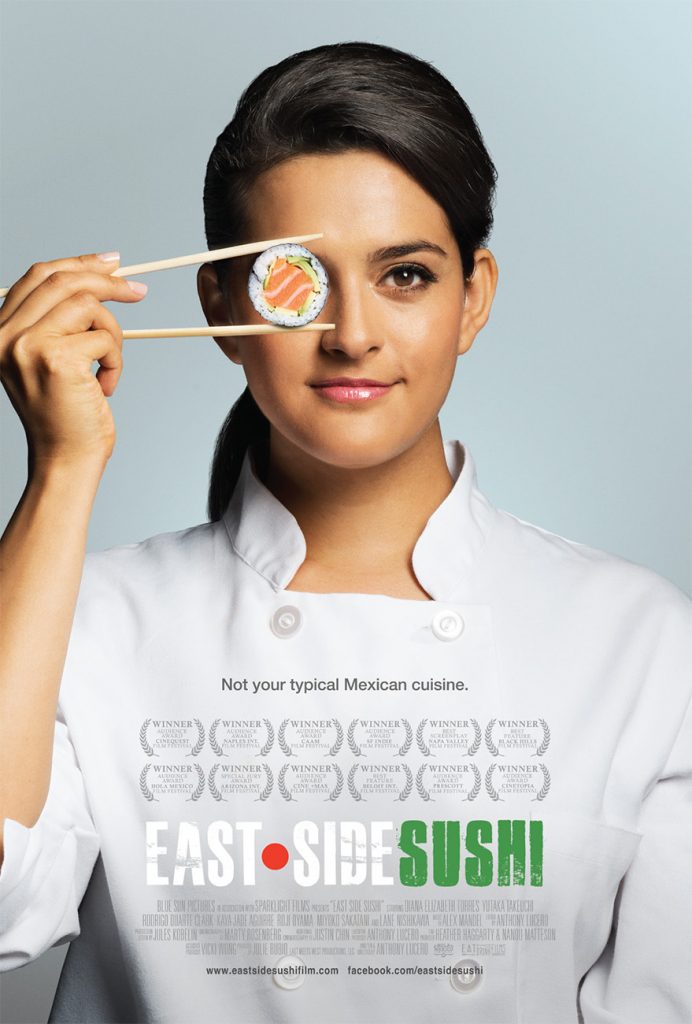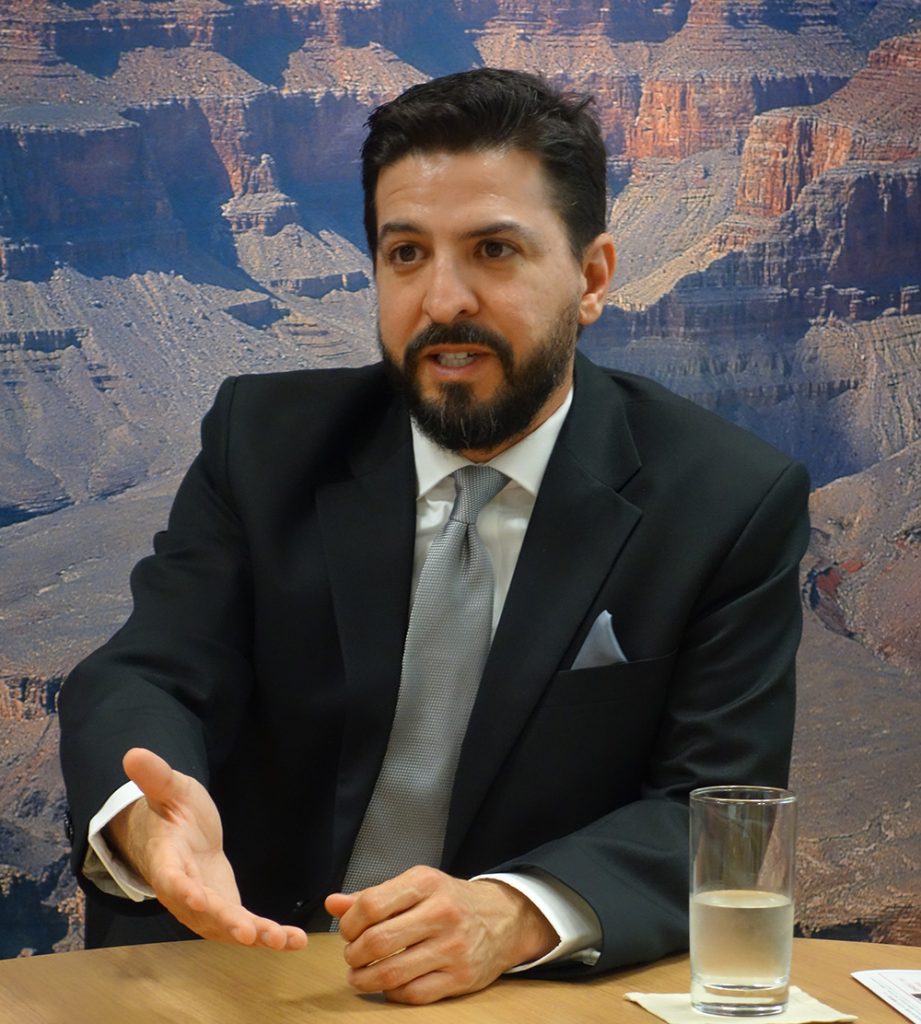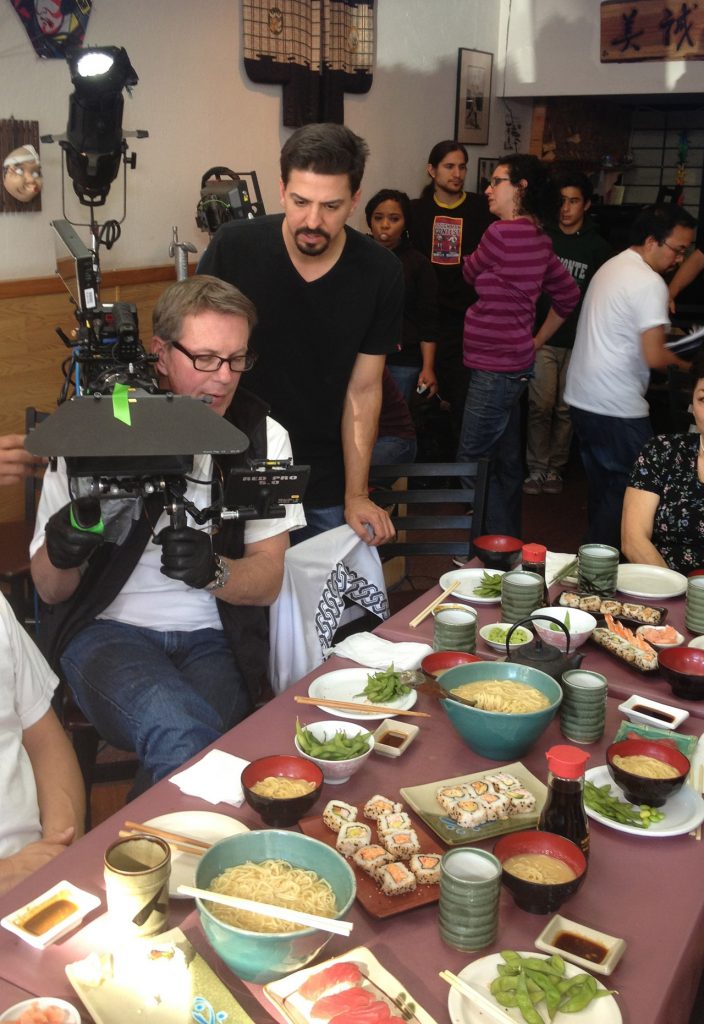The American Center Japan hosted a film screening and panel discussion on May 22, 2017, that was jointly sponsored by the University of Southern California and the U.S. State Department under the auspices of of the American Film Showcase, a project that brings award-winning independent fiction and documentary films from the United States to audiences around the world.
The event featured East Side Sushi, a movie about a Mexican-American single mother named Juana who encounters cultural and traditional barriers and struggles to realize her dream of becoming a professional sushi chef.

(Blue Sun Pictures, LLC)
Anthony Lucero, who wrote and directed the film, was born in Oakland, California. After receiving his B.A. in Cinema from San Francisco State University, he worked on visual effects for such blockbusters as Star Wars, Pirates of the Caribbean, and Harry Potter movies. During the panel discussion after the screening, Lucero and the two other panelists talked about the film and the challenges they faced while making it, later answering questions from the audience.
East Side Sushi tells the story of Juana, who lands a job as an assistant cook at a local Japanese restaurant after she is forced to give up her modest fruit vending cart business when she is robbed. She starts out washing dishes and doing kitchen prep, but her boss recognizes her potential as a cook and asks her to make various Japanese dishes, including sushi. Eventually she attempts to become a sushi chef, but runs into difficulty because she’s not only the “wrong” race, but also the “wrong” gender in the male-dominated sushi restaurant business. Determined not to let anyone stop her from achieving her dream, Juana continues to work hard and perfect her technique until she wins second place in a sushi contest.
In an interview with American View, Lucero talked about what motivated him to make the film, explaining that he wanted to shed light on the Latino immigrants who work behind the scenes in many restaurants in the United States. Lucero’s intention is reflected in the storyline about a Latina who is not given any opportunity to pursue her dream of becoming a sushi chef. “Behind every great restaurant here, there are great Latinos – in the back, in the kitchen, hidden, preparing food and making you all look good,” said Juana in the film.

"East Side Sushi" Director Anthony Lucero responds to a question during the "American View" interview.
Initially Lucero had planned to make the protagonist a man, but he later realized that if the story was about a Latina aspiring to become a sushi chef, which is traditionally a job performed by Asian men, he would be able to portray a “clash” of genders as well as cultures. Lucero said he also wanted to convey “the importance of overcoming obstacles and persevering” through Juana, who is faced with a double roadblock in the film. When asked about how to overcome obstacles, Lucero stressed the importance of “not saying no to yourself.”
Lucero has had plenty of experience dealing with obstacles in his own life. When he started making the film, he was not able to gather enough funding because nobody thought a film about a Latina aspiring to become a sushi chef would be successful. He ended up pouring his own money into the project. In addition, although the film won numerous awards, he struggled to find a distributor since the film doesn’t feature any well-known actors. But after HBO purchased the broadcasting rights, Sony and Samuel Goldwyn Films finally decided to buy the distribution rights. Even though it took a long time, Lucero never stopped believing in himself and his screenplay and continued to pursue his passion.
For 15 years, Lucero was involved in creating visual effects for multimillion dollar blockbusters, working tirelessly day and night. However, he wasn’t satisfied with most of the projects he worked on and often became disillusioned and complained. One day he told himself to “stop complaining and try to make a film that is good.” He left his a steady job and decided to become a screenwriter and director. “I said I’m going to be a writer/director because this is what I want to do,” he recalls. “This was more important to me.”
Lucero’s faith in himself is also reflected in Juana’s role in East Side Sushi. “I’m trying to have an opportunity like everyone else. I deserve an opportunity like everyone else,” she said when the owner of the restaurant she worked at rejected her request to work behind the counter as a sushi chef. She then quit her job that had given her a stable income and poured all her energy into winning a sushi contest. She refused to say “no” to herself.
We asked Lucero if he had any advice for Japanese young people who want to work in the film industry. “What students are taught is to write what they know,” he said. “But I often go to the opposite side and I write about what I don’t know. In this case, I wrote about sushi chefs and single moms and characters that I don’t understand. It’s much more interesting. That’s another way of bridging cultures, right? I’m not a Muslim, so for me to understand that culture, I would write a character for that. It’s a fantastic way to understand cultures.”

Anthony Lucero checks a scene during the filming of "East Side Sushi." (Photo: Blue Sun Pictures, LLC)
Lucero has dealt with cross-cultural encounters in all the films he’s made so far. In his hometown of Oakland and in Berkeley, where he currently resides, he’s lived and worked alongside people with a wide variety of cultural backgrounds. “It was natural for me to write about different cultures,” he explains. He hopes to continue portraying cultural diversity in one way or another in his future films as well. He is currently working on a screenplay for a new TV series. We can’t wait to see where his next adventure takes him!







COMMENTS1
[…] しかし、本作の監督のインタビュー記事を読んだ後に本作の内容を頭で反芻すると「海外でこの作品が評価された理由」が浮かび上がってきます。(参考記事、アメリカン・ビュー ) […]
LEAVE A COMMENT
TOP